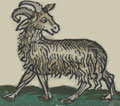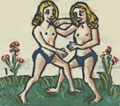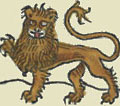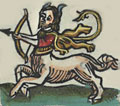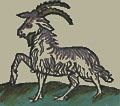Compendium of Medieval Astrology
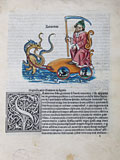 Our contemporaries, especially publishers and journalists, very often use the word "unique". We often hear, "…a publishing house printed this unique book in only a few thousand copies…". In this phrase, the speaker or writer gives the word "unique" the meaning of "not existing until now". However, this is not true - the word has a different meaning. It is derived from the Latin unus, meaning "one". "Unique" means "the only one of its kind, single existing example".
Our contemporaries, especially publishers and journalists, very often use the word "unique". We often hear, "…a publishing house printed this unique book in only a few thousand copies…". In this phrase, the speaker or writer gives the word "unique" the meaning of "not existing until now". However, this is not true - the word has a different meaning. It is derived from the Latin unus, meaning "one". "Unique" means "the only one of its kind, single existing example".
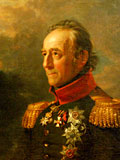 However, publishers have always tended to create copies if not unique in the strict sense, then having unique characteristics that distinguish them from the entire run. Such books are often specifically decorated and designed as gifts for high-ranking persons to became unique. Stored in the Rare Books Department of the National Library of Russia in St. Petersburg, the incunabula Astrolabium Planum in Tabulis by Johann Engel, published in 1488, is one of the earliest examples of such "presentation" copies. In contrast to the main portion of the edition, printed on paper with black and white prints, our Astrolabium is printed on vellum and has beautiful hand-painted illustrations. The bookplate and owner's stamp indicate that the book belonged to the famous St. Petersburg bibliophile General Piotr Sukhtelen in the 19th century.
However, publishers have always tended to create copies if not unique in the strict sense, then having unique characteristics that distinguish them from the entire run. Such books are often specifically decorated and designed as gifts for high-ranking persons to became unique. Stored in the Rare Books Department of the National Library of Russia in St. Petersburg, the incunabula Astrolabium Planum in Tabulis by Johann Engel, published in 1488, is one of the earliest examples of such "presentation" copies. In contrast to the main portion of the edition, printed on paper with black and white prints, our Astrolabium is printed on vellum and has beautiful hand-painted illustrations. The bookplate and owner's stamp indicate that the book belonged to the famous St. Petersburg bibliophile General Piotr Sukhtelen in the 19th century.
The author of the Astrolabium was Johann Engel ( 1463-1512 ). After finishing his studies as a pupil of the famous astronomer, astrologer, and mathematician Johann Muller (Regiomontanus) in Vienna, he eventually became a professor of astronomy there. Engel has prepared several learned treatises during his long life: he published astronomical tables - ephemeris of celestial bodies, made by his teacher Regiomontanus, as well as an improved and enlarged edition of Calendar by Regiomontanus. In addition, he published a revised translation of Abu Ma'shar's eight-volume work De magnis conjunctionibus (On great conjunctions) and edited the fundamental astrology textbook in ten parts Liber Astronomiae or 'Book of Astronomy', written by Guido Bonatti. But the book that earned him the most popularity was Astrolabium planum. To the interpretations of the Zodiac by Italian physician, astrologer and philosopher Pietro d'Abano in treatise Imagines, Engel added illustrations showing the 360 degrees of zodiacal belt with an explanatory sentence for each of them. (The sky is divided into the familiar twelve signs of the zodiac and then into thirty degrees for each sign.) The book includes a brief description of the person who has this degree rising in the horoscope and his/her astrological chart.
Engel's work was published by the printer Erhard Ratdolt ( 1447-1528 ) in 1488. Erhard Ratdolt was born in Augsburg, then, in the age of fifteen, he moved to Italy. In the 1476-1478, he, in partnership with two other German printers, opened a printing house in Venice, which produced about 70 books - mostly mathematical and scientific works, including the first printed edition of Euclid's Elements (1482). In 1486, Ratdolt returned to his native city Augsburg and, two years later in 1488, published Astrolabium which gained much popularity among the reading public. The book opens with a short introduction,
'Here is the beginning of the Comprehensible Astrolabium in the Tables, which contains distribution of celestial houses for every hour and minute, the delay of the embryo in the mother's womb with a useful and beautiful interpretation of births, as well as the local time for each region of the world.'
The book ends with colophon which contains the "publisher's imprint" and played the role of title page in the incunabula,
'So there safely ends the new work Comprehensible Astrolabium in the Tables, written by Johann Engel the Master of the Liberal Arts, [ issued ] before the November calends of the year of 1488 by the remarkable efforts of the skilled man Erhard Ratdolt from Augsburg, as well as through the outstanding printing technique, for which, he is well known, in former time, in Venice, and now in Augsburg.
Thank God.'
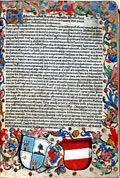 At the beginning of our copy of Astrolabium is the publisher's preface dedicated to the Bavarian Duke Albrecht IV the Wise ( 1447-1508). The preface is decorated by a luxurious frame with a floral design. Two coats of arms are located in the lower margin: one of them belongs to Duke Albrecht IV the Wise (to whom the fine copy was presented) and the other, most probably, to the printer Erhard Ratdolt. An extract from the preface (translated by K.Chistihin) is a good illustrative example of how an European citizen addressed to his Lord without unnecessary derogatory phrases,
At the beginning of our copy of Astrolabium is the publisher's preface dedicated to the Bavarian Duke Albrecht IV the Wise ( 1447-1508). The preface is decorated by a luxurious frame with a floral design. Two coats of arms are located in the lower margin: one of them belongs to Duke Albrecht IV the Wise (to whom the fine copy was presented) and the other, most probably, to the printer Erhard Ratdolt. An extract from the preface (translated by K.Chistihin) is a good illustrative example of how an European citizen addressed to his Lord without unnecessary derogatory phrases,
'The printer Erhard Ratdolt from Augsburg wishes happiness to Albrecht, Count Palatine of the Rhine, the powerful and illustrious Duke of Upper and Lower Bavaria.
It is not unknown to me, illustrious Duke, that ancient glorious men of all skills and trades worked very hard to either create new writings, or, to reproduce already written works fairly, but sometimes their efforts didn't do any good for people, because many of their volumes, as if born prematurely, faded into a fog of the blind oblivion as soon as they had appeared for public. What reason explains this better then a lack of scribes, who would help the outstanding monuments of science to be preserved for posterity in a rich variety of books, because some were considered to be extremely lengthy..., and others, like mathematical disciplines, to be the most hardest to translate because of the countless schemes. In our happy time, this can be easily avoided, because it is obvious that, day by day, more and more numerous volumes come out with wondrous ease for public use, so much wide that the work of everyone who has ever done something well, can not vanish or go out of people's memory. We believe this truly provide a wonderful stimulus for talented people. The stimulus is proven by experience and so powerful that it does not allow any of students to fall in laziness and idleness, spurring any of them with constant hits and vigorously forcing them to exercise their talent…
as is generally known: one versed in all the sciences gives preference to astronomy. It is very clearly seen that, in this connection, as in others, you follow the example of those great and mighty kings and princes, who were as much inquisitive in the science of the stars, as magnificent in a blaze of their glory. So, this new book is not spoiled with any foreign flavour, but, since the printing press, was committed to honest, hard work and was sent to you. O Gracious Prince, take it with your kind approval so that, under your celebrated protection, it could be brought to society in the peaceful and happy path…'
We now understand the joy of the printer that his publication will not be lost, will not sink into oblivion due to his art creating a lot of copies. And Ratdolt was right - the book was in great demand: it did not take long before the work of Johann Engel was reissued. Under the title Astrolabium planum in tabulis ascedens it was republished by Johann Emerick in Venice already five years later - in 1494, the English translation was made in 1655. The Russian translation appeared in 2006, it was made from the second - Venetian edition1.
To help the readers gain a fuller understanding of this remarkable item, we offer them to view images of hand-coloured prints and texts, discovering qualities and characteristics of zodiac signs, in translation of Daria Krukova and Anastasia Shapovalova.
Description of the persons fignified by the Zodiac Signs:

